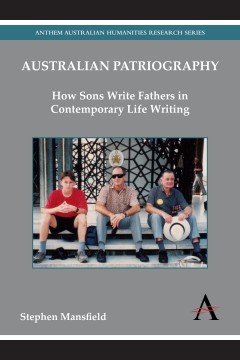Australian Patriography
How Sons Write Fathers in Contemporary Life Writing
By Stephen Mansfield
- About This Book
- Reviews
- Author Information
- Series
- Table of Contents
- Links
- Podcasts
About This Book
This study discusses modern Australian life writing by sons who focus on their fathers. Termed patriography (by Couser) or The Son’s Book of the Father (by Freadman), this rich field of relational autobiography offers insights into modes of masculinity, notions of identity and heritage and the ethics of representation. The current proliferation of ‘father memoirs’ in the marketplace demonstrates that such writing is fulfilling and being fuelled by the need to better understand the traditionally lesser-known parent.
Beginning with an analysis of the paradigmatic case of the sub-genre, Edmund Gosse’s Victorian masterpiece ‘Father and Son’, the study moves quickly on to embrace its Australian literary frame, demonstrating Gosse’s influence on a range of classic Australian autobiographies, including Hal Porter’s ‘The Watcher on the Cast-Iron Balcony’. Mansfield then offers five ‘case studies’ on the seminal works of the current era: Raimond Gaita’s ‘Romulus, My Father’; Richard Freadman’s ‘Shadow of Doubt’; Peter Rose’s ‘Rose Boys’; John Hughes’s ‘The Idea of Home’; and Robert Gray’s ‘The Land I Came Through Last’.
How do these authors ‘perform’ their masculinity in the act of writing the father? What are some of the ethical complexities that must be negotiated when representing the reticent-laconic in autobiography? And, ultimately, how does one decide what an ethical representation of the father is? These are some of the questions Mansfield addresses in ‘Australian Patriography’, the first study of its kind in Australian literature.
Reviews
‘This book is about autobiographical writing in Australia, but Stephen Mansfield’s work has profound implications for patrimonial life narratives and father–son relationships everywhere. Employing scholarship from psychology, sociology and humanistic literary study, he exposes both the fault lines of Australian father–son relationships, with their emphasis on silence, privacy and repression, but also honours the way the life writers strive to understand and repair the damage arising from those affiliations. Mansfield renders the voices in those memoirs with a powerful, reverberative voice of his own.’ —Roger Porter, author of ‘Bureau of Missing Persons: Writing the Secret Lives of Fathers’
‘This thoroughly insightful study of patriography fills an important gap in life writing scholarship. Mansfield makes a crucial contribution to Australian literary studies in his analysis of autobiography, masculinity and the paternal inheritance. “Australian Patriography” offers an original and significant review of contemporary literatures which will resonate broadly.’ —Kate Douglas, author of ‘Contesting Childhood: Autobiography, Trauma and Memory’
‘“Australian Patriography” illustrates the major virtues of scholarly writing: depth, incisiveness and clarity. It ambitiously brings together literary and sociological interests in the service of superb textual analysis. Stephen Mansfield’s study is not only a major addition to the scholarship of Australian life writing, but to that of life writing generally.’ —David McCooey, author of ‘Artful Histories: Modern Australian Autobiography’
Author Information
Stephen Mansfield is an independent scholar as well as a casual research assistant and tutor in the Department of English at Sydney University, Australia.
Series
Anthem Australian Humanities Research Series
Table of Contents
Acknowledgements; List of Illustrations; Introduction Writing Patrimony: The Son’s Book of the Father as a Sub-genre; PART I: CHALLENGING AUTHORITY: Chapter One: ‘The Paradigm Case’: Contesting the Father in Edmund Gosse’s ‘Father and Son: A Study of Two Temperaments’; Chapter Two: ‘An Indubitable Australian’: Renouncing the Father in Hal Porter’s ‘The Watcher on the Cast-Iron Balcony’; PART II: MEMORIALISING SELF-DENIAL: Chapter Three: ‘Words to Keep Fully Amongst Us’: Honouring the Father in Raimond Gaita’s ‘Romulus, My Father’; Chapter Four: ‘I Really Was the Son of Such a Man’: Replacing the Father in Richard Freadman’s ‘Shadow of Doubt: My Father and Myself’; PART III: PERFORMING MASCULINITY: Chapter Five: A Speaking Subject/A Watching Object: Addressing the Father in Peter Rose’s ‘Rose Boys’; Chapter Six: Choosing Patrimony: Performing for the Father in John Hughes’s ‘The Idea of Home’; Chapter Seven: ‘Neither to Vindicate nor to Vilify’: Becoming the Father in Robert Gray’s ‘The Land I Came Through Last’; Conclusion: The Turn to the Father in Autobiography; Bibliography; Index
Links
Stay Updated
Information
Latest Tweets



